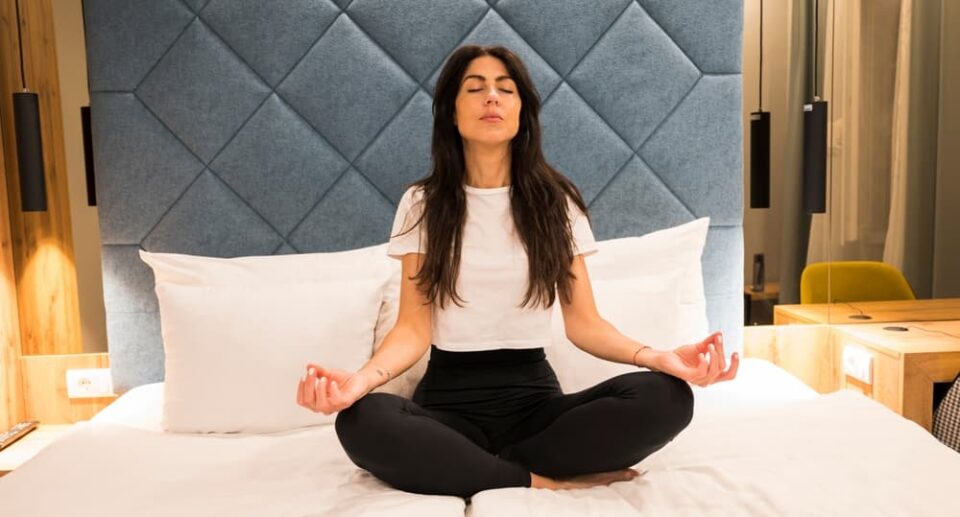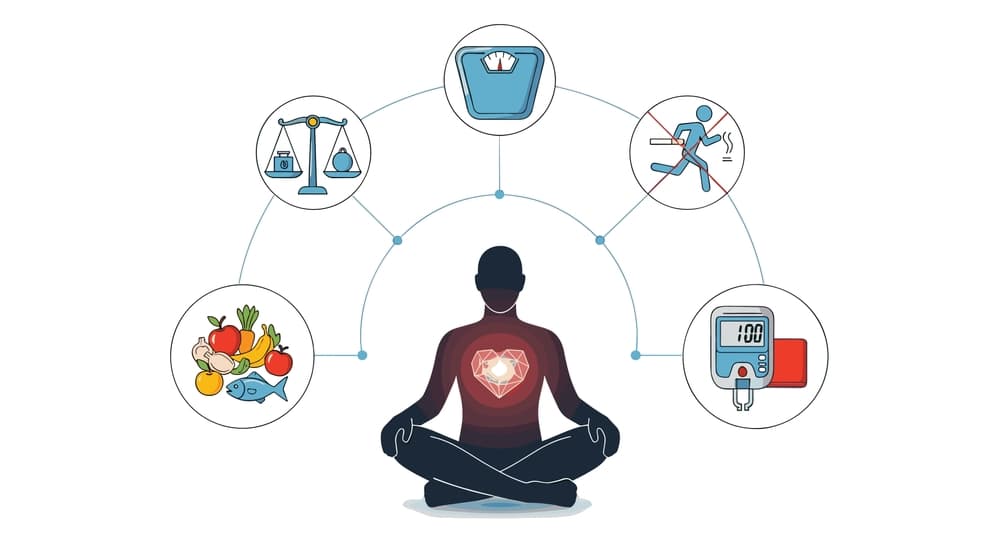How to calm your mind before bedtime


Does the stress of the day, personal problems, or worries about the future make it difficult for you to fall asleep? If so, it’s normal. The fast pace and stress of modern life often make our minds overactive before bedtime, resulting in insomnia or sleep disturbances.
The importance of good sleep is undeniable. Because sleep is not only a rest for the body, it is also essential for brain health, attention, and emotion regulation. Being able to calm your mind just before bedtime is a powerful habit that can improve your overall health.
In this article, we will discuss some effective and proven ways how to calm your mind before bedtime, which will make your bedtime routine peaceful. From simple breathing exercises to special techniques for dealing with anxiety, each tip will help you fall asleep faster. If your goal is a quiet and uninterrupted sleep, then let’s start by knowing the techniques that will calm your mind and open the door to sleep.
Harvard Medical School (2021):
“Mindfulness meditation can improve sleep quality by reducing stress and anxiety.”
Creating a Peaceful Bedtime Routine
Stop Screen Time: Digital Detox
Effects of Blue Light: Blue light emitted from mobile, tablet or TV screens prevents the release of melatonin hormone in our brain. Melatonin is the hormone that is essential for us to fall asleep.
Things to do: Completely stop using all types of digital screens at least 1 hour before going to bed. This will prevent your brain from being stimulated and prepare you for sleep.
Comfortable warmth
Warm bath or shower: Taking a bath with lukewarm water 1-2 hours before going to bed increases the body temperature slightly, and when it starts to decrease rapidly after the bath, the body feels comfortable and sleep comes. It also helps reduce muscle tension.
Hot drinks: Drink caffeine-free warm beverages. For example: herbal tea (chamomile or lavender), warm milk or golden milk (milk mixed with turmeric). These drinks help calm the mind.
Light and relaxing activities
Reading habits: Read a physical book. Reading a book focuses the mind on a specific area and frees it from the thoughts of the day. Remember, a printed book, not an electronic device, is best for this time.
Light stretching or yoga: Do some very light stretching or yoga poses (such as legs up the wall or butterfly pose). This will relax the muscles of the body and reduce stress. Avoid heavy exercise or cardio.
Soothing music: Listen to calm, instrumental music or nature sounds. This calms the nervous system and helps to put the mind in a meditative state.
Prepare the environment
Light control: Use dim or dim lights in the room. Avoid bright or harsh lighting. Make it completely dark if possible.
Clothing: Wear loose, comfortable clothing. Be careful not to overheat your body while sleeping.
Mindfulness and meditation


How does mindfulness work?
Mindfulness is the practice of paying attention to the present moment consciously and non-judgmentally. Before sleep, it calms your brain’s ‘fight or flight’ response and activates the parasympathetic nervous system, which prepares the body for rest and digestion. It also helps reduce levels of the stress hormone cortisol.
Effective meditation techniques for sleep
American Psychological Association (APA, 2020)
Studies have shown that excessive thinking or emotional stress before bedtime reduces sleep quality and increases cortisol levels, which disrupts the sleep cycle.
Incorporating the following methods into your bedtime routine will help your mind calm down quickly:
Guided meditation
Guided meditation is a practice in which a trainer helps you relax through various imagery or instructions in a calm voice.
Benefits: This is very easy for those who are new to meditation. You just close your eyes and follow the instructions. This prevents your mind from getting distracted.
Things to do: You can easily find “Sleep Meditation” made for sleep on various meditation apps or YouTube. Set a timer so that it stops automatically even if you fall asleep.
Body Scanning Meditation
This is a special technique that focuses on the body and eliminates mental tension.
Method:
Lie down in a comfortable position on the bed and close your eyes.
Start your attention at the very bottom of your body (such as feet or fingers).
Gradually move your attention to the upper part of the body (ankles, knees, waist, stomach, chest, hands, shoulders, neck and finally the head).
Notice what you feel in each part, whether there is any pain or tension, but do not judge.
Focus on each part for a moment and let those muscles relax.
This process shifts your attention from the worries of the brain to the sensations of the body, which forces the mind to calm down.
Breathing Exercise: 4-7-8 Technique
This technique is very popular and effective for quickly calming the mind and reducing heart rate.
Method:
- Place the tip of your tongue just behind your two front teeth.
- Forcefully exhale all the air from your lungs through your mouth.
- Now close your mouth and inhale slowly through your nose for 4 seconds.
- Hold your breath for 7 seconds.
- Now purse your lips and exhale slowly through your mouth for 8 seconds.
- Repeat this cycle at least 4 times without taking a break.
Thought Control and Journaling
Setting Up ‘Worry Time’
It is very normal to have anxious or worrying thoughts before bed. But these thoughts should be captured at a specific time of day, not in bed.
What to do:
Allocate a specific time of day (e.g. 7:00 PM to 7:15 PM) just for worrying.
During these 15 minutes, write down all your worries, unresolved tasks, or problems in a ‘worry journal’.
When the time is up, close the journal and tell yourself that these thoughts will now be on hold until morning.
Benefits: This practice teaches your mind that thoughts have a specific place and time, so they don’t disrupt your sleep when you get to bed.
Sleep-aiding journaling


Three types of journaling are very effective for reducing stress before bed:
Task dump
Task dump is the act of writing down the tasks that come to mind at night on a piece of paper.
Method: Before going to bed, write down all the urgent emails, shopping lists, or remaining tasks that come to mind for the next day.
Benefits: When thoughts are transferred from your brain to paper, your brain thinks that the task is now saved, so it doesn’t have to be vigilant to remember it anymore.
Gratitude journal
Positive thinking gives the mind a peaceful feeling.
Method: Every day before going to bed, write down just three things for which you are grateful that day. It can be something small, like a nice cup of tea or a nice conversation with a friend.
Benefits: It shifts your focus from worries to positivity, which quickly relaxes the mind.
Bedside notepad
If an important thought or worry suddenly comes to mind at night, it is not possible to get up and start worrying right away.
Method: Keep a small notepad and pen next to the bed. If an urgent thought comes to mind at night, just write it down in one or two lines and go back to sleep.
Benefits: As soon as you ‘write down’ the thought, your brain dares to forget it, because it knows that the idea will not be lost, but is safe for the next day.
Optimizing the sleep environment
The bedroom environment is very important for good sleep and quick calming of the mind. Your bedroom should be made a “sleep haven” that is only suitable for rest and peace. This is called one of the most important parts of sleep hygiene.
The right temperature
A cool room: The process of falling asleep is easier when your body’s core temperature drops. Studies have shown that the ideal room temperature for most people to sleep is between 16°C and 20°C.
Do’s and Don’ts: Don’t keep your bedroom too hot or too cold. Use AC or a fan in the summer, and avoid extra blankets in the winter and use breathable bedding.
Darkness and light control
Melatonin release: Light keeps our brain awake. Complete darkness encourages melatonin release.
Do:
Use heavy curtains (blackout curtains) to prevent any outside light (street lights, lamps) from entering the room at night.
If complete darkness is not possible, you can use a comfortable eye mask.
Make sure that even the subtle light from small LED lights or devices does not fall on your eyes.
Noise control
Quiet environment: Any sudden or loud noise during sleep disrupts brain activity, even if you do not wake up.
Do:
If possible, keep doors and windows closed to avoid outside noise.
You can use earplugs if necessary.
Some people find comfort in listening to continuous quiet sounds, which helps reduce the impact of sudden noises.
Use only for sleep
Brain connection: You need to teach your brain that bed means sleep.
Do’s and Don’ts: Avoid working, eating, or watching TV in bed completely. Save your bed for sleep and intimacy only. This will help your brain automatically prepare for rest as soon as you get into bed.
Food and Drinks
What to Avoid
Avoid the following foods and drinks at least 2 to 3 hours before bed:
Caffeine: Caffeine, found in tea, coffee, cola, or energy drinks, is a stimulant. It keeps the central nervous system active, making it difficult to relax and disrupting sleep. Avoid caffeine completely after evening.
Heavy and Fatty Foods: Eating oily, spicy, or heavy foods just before bed keeps your digestive system alert. The body has to work harder to digest, which makes it difficult to relax. Dinner should be light and easily digestible.
Sugary foods: Ice cream or sweets instantly increase blood sugar levels, which provides extra energy to the body and delays sleep.
What to eat
Certain food ingredients help relax the mind and promote sleep:
Magnesium-rich foods: Magnesium calms the mind and helps relax muscles. Nuts, seeds, bananas and spinach are good sources of magnesium. You can eat a handful of nuts shortly before bed.
Tryptophan-rich foods: Tryptophan is an amino acid that helps produce melatonin and serotonin. Eggs, cheese, oats and milk are good sources of tryptophan.
Light carbohydrates: A piece of toast or a few crackers can help tryptophan enter the brain.
Drinks


Herbal teas: Drink tea made with chamomile, passion flower or valerian root before bed. These herbs act as natural sedatives.
Warm milk: Drinking warm milk is an age-old habit. Milk contains tryptophan, and the act of drinking a warm beverage relaxes the mind.
Remember, you should also avoid drinking large amounts of water right before bed, as this can cause you to wake up to urinate at night. By controlling your diet, you can calm your mind internally and pave the way for sleep.
FAQ
Q1. How can I calm my mind before bedtime?
Try deep breathing, meditation, or avoiding screens to relax your mind and prepare for better sleep.
Q2. Why do I feel restless before sleep?
Stress or overthinking often keeps the mind active. A calm bedtime routine helps you unwind faster.
Key Takeaways on How to calm your mind before bedtime
Good sleep is essential not only for our physical well-being, but also for mental peace and efficiency. Some conscious habits prepare your brain for rest. Creating a proper bedtime routine, staying away from digital devices, focusing on the present moment through mindfulness and breathing exercises, and keeping worries away from bed through journaling are all steps that can help you get a deeper sleep. Also, small changes like maintaining a conducive sleep environment (the right temperature and darkness), and avoiding caffeine and heavy meals in the evening can make a big difference in the quality of your sleep.
Start small, stay mindful, and create your calm corner for a happier work life.
“Ready to level up your wellness? Subscribe to CoreWellFit now.”









